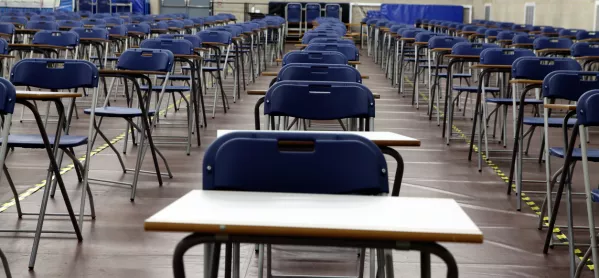- Home
- Will exam boards become an irrelevance after Covid-19?
Will exam boards become an irrelevance after Covid-19?

It’s a strange world we find ourselves in, where the value of each aspect of the education system has been called into question and every institution has to adapt to survive.
Nowhere have the questions been more searching than when the exam season was abandoned and teachers asked to provide student grades and rankings.
Where does that leave exam boards and schools in terms of their individual roles and, more tellingly, the partnerships forged in the recent past?
Looking beyond assessment-led curriculums
The vacuum left when there was no longer any need for exam preparation was soon filled by enterprising teachers who had been waiting for years for the chance to provide a more relevant learning experience in the last third of the school year for Years 11 and 13.
For many of us teaching beyond specifications it’s a chance to experiment with assessments to find the most motivating ways of gauging learning.
Maybe we’ve even asked ourselves how far the current assessment-led curriculum has served education in its broadest sense.
The lockdown has been a time to focus on the processes of learning rather than shoe-horning lessons into the exam mould.
Could this be the moment the pendulum swings away from the stranglehold of the accountability system and the over-rigid structures controlling the experience of students and teachers?
Learning without exam hoops
More importantly, it has been a time when learning itself has found relevance beyond the exam board specifications.
Perhaps it’s also time to set our sights higher than the instrumental training provided by the boards and some training organisations that focus on getting students over particular grade boundaries.
What an irrelevance such concerns seem when their raison d’être - the final exam - disappears.
It made me think back to the lowest point for me in the relationship between exam boards and schools at a launch meeting for the 2010 specifications (controlled assessment).
When the sales pitch was over, heads of English were invited to stay behind so they could be shown how to plan the two-year GCSE experience to meet all the assessment objectives - a bit like staying behind after school for a catch-up lesson.
It was a moment of shame where I realised how low the profession had sunk that an exam provider thought it needed to tell us how to organise our subject, how to run our departments or even how to be outstanding heads of department.
Constraints on exam boards
To be fair, the freedoms the exam boards themselves once enjoyed have been steadily whittled away by the growing power of Ofqual.
Through its exams regulator, the government has handed down its criteria from which the boards have manufactured their specifications.
With each government intervention, the specifications have become more specific, unwieldy and uninspiring - the bureaucrats’ dream but not the teachers’.
A recent Tes article on how GCSE English has turned teenagers off the study of English reflects the disillusionment felt by the profession.
Exam boards have not been totally oblivious to this developing crisis. Certainly, I have been privileged to attend several consultation meetings with stakeholders in which an alternative model to the cramming now in vogue has been discussed.
It seems that where once the boards and teachers found common ground in creating and writing syllabuses, and where even in the past exam boards have been happy to endorse syllabuses created by teachers, now the common ground is a shared fear that teaching has become mechanistic and a love of learning lost.
A neutered statistical function
Still, all that seems like a different world now.
In the wake of the cancellation of exams this year, a new form of validation of A level and GCSE courses had to be hastily cobbled together.
The boards are operating at several removes from the actual setting and marking, which they used to control through paper-setting committees and an army of examiners overseen by teams of senior assessment specialists.
Even at the height of 100 per cent coursework, which gave teachers the greatest influence over setting of tasks, exam boards had closer contact with the actual work through which to evolve a standard.
Now schools are finally inputting their grades and (most crucially) their rankings onto exam board databases, the only function required from these once-mighty assessment bureaucracies is that they use their prior knowledge of schools’ performance to make the mould into which the teachers’ ranking of students are poured.
To many of us, it may seem that the hitherto pretentious re-branding of exam boards as awarding organisations has an unfortunate grounding in the reality of our current situation.
Gone is the expertise of creating and carrying out assessment and the evaluation of grade boundaries (informed by statistical norming of course).
What is left is a strangely neutered function of endorsing schools’ ranking under the watchful eye of the exams regulator.
And with that a question mark over the relevance of exam boards this year - and possibly next year too.
Yvonne Williams is a head of English and drama in a school in the South of England
Keep reading for just £1 per month
You've reached your limit of free articles this month. Subscribe for £1 per month for three months and get:
- Unlimited access to all Tes magazine content
- Exclusive subscriber-only stories
- Award-winning email newsletters



